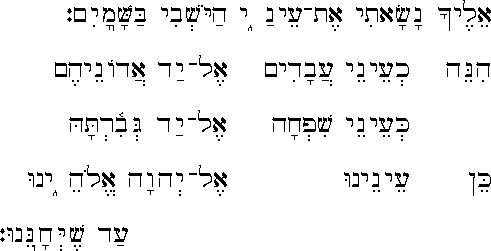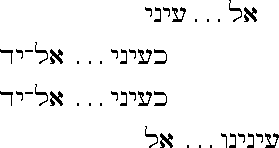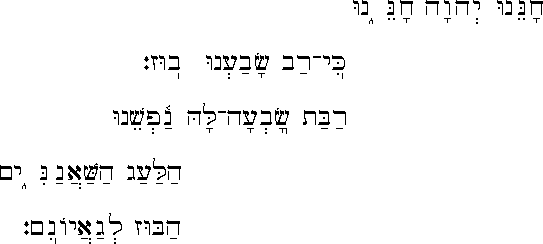Psalm 123
1. Translation
1. A song of ascents
To you I raise my eyes, you who sit enthroned in heaven.
2. Even as the eyes of slaves, on the hand of their master,
as the eyes of a maid, on the hand of her mistress,
so are our eyes on Yahweh our God
until he has mercy on us.
3. Have mercy on us, Yahweh, have mercy on us,
because we are choked full with contempt
4. our soul is choked full
with the derision of those who are at ease,
with the contempt of the proud.
2. Exegetical Idea
Subject: The covenant people of Yahweh
Complement: look to him alone to help them in their dire need,
and wait patiently for him.
3. Outline
A. The Psalmist lifts his eyes out of his present circumstances,
and looks for his hope to the one who has his throne in heaven.B. The Psalmist waits passively and patiently for Yahweh,
convinced that he is his only hope.C. An urgent and desperate call to Yahweh for help
because of the extreme anguish of the situation.
4. Exegetical Commentary
Structure
The Psalm is tightly structured, and may be divided into two strophes: v.1,2 and v.3,4. Both strophes exhibit staircase parallelism, and both use repetition of key words to tie the lines together and enhance the urgency of the request. The climax of the first strophe is used as the launching point for the second.
Strophe 1

Strophe 1 is characterized by a fourfold repetition of the words ‘eyes’ and ‘to’. Allen suggests an A B B’ A’ structure as follows:

The final words of v.2 form the climax of the staircase "until he has mercy on us". This idea is the starting point for the second strophe.
Strophe 2

Here the staircase formation is readily evident. Allen points out that three
pairs of terms are doubled: ![]() The
A. doubling increases the urgency of the plea. The B. doubling ties together the
end of the line in v.3 with the start of v.4
which is necessary to allow the staircase structure to be carried forward to a
new idea. Doubling C. elegantly rounds off the Psalm by linking back to the end
of v.3.
The
A. doubling increases the urgency of the plea. The B. doubling ties together the
end of the line in v.3 with the start of v.4
which is necessary to allow the staircase structure to be carried forward to a
new idea. Doubling C. elegantly rounds off the Psalm by linking back to the end
of v.3.
Several commentators (e.g. Perowne) point out that the Psalm is remarkable for number of rhymes, but these are probably not significant poetically.
Setting
Perowne suggests that the Psalm is either the sigh of the exile, towards the close of the Captivity, or the sigh of those who have returned and are scorned.
Form
An interesting feature of the Psalm is the way that the singular voice of v.1 becomes plural in the rest of the Psalm. Anderson and Allen suggest that the first line might have been sung by a precentor, and the rest sung antiphonally by the congregation. This is a possible explanation, but it does not seem necessary. It would be quite possible for either an individual or a group to sing the whole song without worrying about the change in number. The first verse reflects more the individual response of faith, and the other verses emphasize that the whole company is suffering and crying out. The Psalm is generally taken to be a community lament.
Title
The title "A Song of Ascents" occurs in Psalms 120 through to 134. The meaning is uncertain, but it is often been explained as a "Pilgrim Song" which would have been sung by pilgrims as they travelled upwards to Jerusalem for the feasts (Dahood). Another suggestion is that the Levites sang these Psalms as they ascended the Temple steps. Dahood makes a further suggestion, that discoveries at Qumran make possible the translation "song of extolments" (Dahood, Ps. 120)
A. (verse 1)
The Psalmist lifts his eyes out of his present circumstances,
and looks for his hope to the one who has his throne in heaven.
Perowne describes the Psalm with the following quotation:
"the Psalm needs no singular or exceptional charm. It is perfect as it stands. It is a little gem, gut with the most exquisite art. Few poems, inspired or uninspired, have been more admired or beloved. It has the charm of unity. It limits itself to one thought, or rather it expresses a single mood of the soul--the upward glance of a patient and hopeful faith."--Rev. S. Cox, The Pilgrim Psalms, p. 69.
The Psalmist is in trouble. The question is: where should he turn? He needs
to turn to a higher power than the one which is oppressing him. The song begins
with ![]() in the emphatic position. The addressee is
not immediately revealed, but we are told that he is the one who sits in the
position of power in the heavens. Immediately the two poles of the Psalm are
marked out: the struggling Psalmist, filled with contempt, and the almighty
ruler in the heavens. The remainder of the Psalm refines the relationship
between these two entities.
in the emphatic position. The addressee is
not immediately revealed, but we are told that he is the one who sits in the
position of power in the heavens. Immediately the two poles of the Psalm are
marked out: the struggling Psalmist, filled with contempt, and the almighty
ruler in the heavens. The remainder of the Psalm refines the relationship
between these two entities.
Kidner writes: "If the traveller in Psalm 121 had to learn to look higher than the hills, this sufferer, even more hemmed in, has won the same victory. His words, soaring above his circumstances, set his troubles in a context large enough to contain them."
According to GKC §90m, the Hireq compaginis
is on the end of ![]() as an ornamental device of
poetic style. It serves the purpose of giving the participle more dignity.
as an ornamental device of
poetic style. It serves the purpose of giving the participle more dignity.
B. (verse 2)
The Psalmist waits passively and patiently for Yahweh,
convinced that he is his only hope.
This section contains the most vivid imagery of the Psalm set in an equally vivid structure. The Psalmist could have made just one comparison, but he makes two, delaying the resolution and heightening the tension before revealing to whom the Psalm is addressed. The almost exact repetition of the image of servant and master emphasizes the simile and burns it into the imagination.
One might have expected that the final line would have said that it was to
the hand of Yahweh that we look, but this would have been redundant
information, and would have held up the flow of the Psalm, which rushing
forwards to a cry for mercy. The Psalmist still uses two words to preserve the
balance with the previous lines, but says ![]() instead of
instead of
![]() . This possessive emphasizes the
covenant relationship that exists. As Allen has put it:
. This possessive emphasizes the
covenant relationship that exists. As Allen has put it:
The community acknowledges, and pleads, that the covenant relationship ("our God") places them in the position of slaves before their divine master. They are utterly reliant upon him. The corollary of this relationship is that he has committed himself to support them as his protégés. For his help they have been waiting and will wait on expectantly, conscious that they have no other help save his.
An important question that needs to be asked is: for what reason are the slaves looking to the hand of the master? Possibilities are a) that they are looking to him to end their punishment, b) that they are watching for a command in the form of a hand signal, or c) that they are waiting for food to be given. The last suggestion is generally preferred by the commentators. In support of this, consider Ps. 104:27:
These all wait for you, that you may give them their food in due season.
What you give them they gather in; you open your hand and they are filled with good.
Even more relevant is Ps. 145:15,16
The eyes of all look expectantly to you, and you give them their food in due season.
You open your hand and satisfy the desire of every living thing.
The structure of v.2 carries forward the song to a climax:
| eyes of slave | hand | master | |
| eyes of slave | hand | master | |
| eyes of us | master | ||
| till he has mercy on us |
This climax forms the launching point for the second strophe
C. (verses 3 & 4)
An urgent and desperate call to Yahweh for help
because of the extreme anguish of the situation.
The first line picks up the plea from the end of the last strophe, and
desperately echoes it. The remainder provides the reason, by painting a picture
of their plight. Use of the verb ![]() is striking.
There is a hypokatastasis, with the contempt pictured as food with which they
are satiated. The unusual and striking aspect is that food is usually good, and
the verb is almost always used in a good sense--of
being satisfied. Here, however, the ‘food’ is rammed down their throats
until they can take no more. They cannot stomach any more, to use an English
idiom. It is repulsive to think of a person so full that they are in pain, yet
this unusual juxtaposition of ideas provokes just such a revulsion. The verb is
emphasized with
is striking.
There is a hypokatastasis, with the contempt pictured as food with which they
are satiated. The unusual and striking aspect is that food is usually good, and
the verb is almost always used in a good sense--of
being satisfied. Here, however, the ‘food’ is rammed down their throats
until they can take no more. They cannot stomach any more, to use an English
idiom. It is repulsive to think of a person so full that they are in pain, yet
this unusual juxtaposition of ideas provokes just such a revulsion. The verb is
emphasized with ![]() . There is an urgency in the
situation. They just cannot take any more and something will have to happen
soon. It is remarkable, however, is that although they are in a severe trial,
there is a "entire absence of anything like impatience in the Psalm" (Perowne).
. There is an urgency in the
situation. They just cannot take any more and something will have to happen
soon. It is remarkable, however, is that although they are in a severe trial,
there is a "entire absence of anything like impatience in the Psalm" (Perowne).
The Psalm ends with an oblique reference to their adversary. "Their disaster has been aggravated by the brutal jeering of other whose own lives are untrammeled by affliction." (Allen). Those who are at ease, or arrogant, are laughing at them cruelly. The proud are contemptuous of them. Kidner says:
It is illuminating that contempt is singled out for mention. Other things can bruise, but this is cold steel. It goes deeper into the spirit than any other form of rejection; in the Sermon on the Mount it ranks as more murderous than anger (Mt. 5:22). it is particularly wounding when it is casual or unconscious; but if it is deserved and irreversible it is one of the pains of hell (Dn. 12:2)
There is a Q reading in v.4 which would read one word as two. The Masora reckons this word is one of fifteen which are written as one and read as two. Delitzsch rejects the Q reading saying: "this genitival construction appears to be far-fetched, and, inasmuch as it makes a distinction among the oppressors, inappropriate."
5. Application
We are sometimes in situations where it seems there is nothing we can do but pray to God. We are entirely dependent on God, and yet at the same time our problems seem urgent and increasingly intolerable. This Psalm provides a beautiful picture to calm our raging and focus our faith. The servants stand with their eyes fixed on the master. They know there is nowhere else to look, and there is nothing they can do themselves. Yet they are not impatiently hopping from one foot to another, because they belong to their master--he will take care of them, has always taken care of them.
We need to remind ourselves of our covenant relationship, which works both ways. God will care for and preserve us, but we must look only to him for our help. If the Psalm were to be summed up in one phrase, it would be "utter dependence on the Lord".
Bibliography
Allen, L. C., Psalms 101-150, Word Biblical Commentaries vol. 21, Waco: Word Books, 1983.
Anderson, A. A. The Book of Psalms, New Century Bible, London: Marshall Morgan & Scott, 1972.
(references in the text are to A. A. Anderson)
Anderson, B. W., Out of the Depths, The Psalms Speak for Us Today, Philadelphia: Wesminster Press, 1983
Dahood, M., The Anchor Bible, Psalms vol. III, New York: Doubleday, 1970.
Delitzsch, F., Psalms, vol. 3, repr. Grand Rapids: Eerdmans, 1960.
Kidner, D., Psalms 73-150: A Commentary on Books III-V of the Psalms, Tyndale O.T. Commentaries, Downers Grove, IL: Inter Varsity Press, 1975.
Perowne, J.J.S. The Book of Psalms, repr. Grand Rapids: Zondervan, 1966
- Printer-friendly version
- Login to post comments

